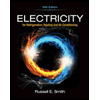Repeat the calculations for C-200uF and C-2200uF. Repeat the calculations for RL-27092, C=100uF. Full-Wave Rectifier with CLC Filter For the circuit in Figure 15, determine VMax (peak after diode drops), Vr (ripple voltage), y (ripple factor), and the DC output voltage VDC. Vin_pp=22.8Vpp@60Hz (Vpeak-11.4V before the diode drops), RL=1350, Ci=100uF, Li=10mH, Rx=2792, VD=0.7V. Recommendation is to solve for VMax, then use the formula for VDC, substitute VDC=IDCRL and solve it out for IDC in terms of Vr. Substitute this for IDC in the Vr formula and solve for Vr. Then substitute the Vr value in the prior formula to solve for IDC. Keep in mind that VMax_AC is the peak ripple voltage and Vr is the peak-to-peak ripple voltage (they are off by a factor of 2). From Wall Outlet 120Vrms (340Vpp) Transformer DO NOT Connect these two wires! D₁ L1 Probe RL C₁ Figure 15: Full-Wave Rectifier with CLC Filter Probe GND GND Vout
Repeat the calculations for C-200uF and C-2200uF. Repeat the calculations for RL-27092, C=100uF. Full-Wave Rectifier with CLC Filter For the circuit in Figure 15, determine VMax (peak after diode drops), Vr (ripple voltage), y (ripple factor), and the DC output voltage VDC. Vin_pp=22.8Vpp@60Hz (Vpeak-11.4V before the diode drops), RL=1350, Ci=100uF, Li=10mH, Rx=2792, VD=0.7V. Recommendation is to solve for VMax, then use the formula for VDC, substitute VDC=IDCRL and solve it out for IDC in terms of Vr. Substitute this for IDC in the Vr formula and solve for Vr. Then substitute the Vr value in the prior formula to solve for IDC. Keep in mind that VMax_AC is the peak ripple voltage and Vr is the peak-to-peak ripple voltage (they are off by a factor of 2). From Wall Outlet 120Vrms (340Vpp) Transformer DO NOT Connect these two wires! D₁ L1 Probe RL C₁ Figure 15: Full-Wave Rectifier with CLC Filter Probe GND GND Vout
Electricity for Refrigeration, Heating, and Air Conditioning (MindTap Course List)
10th Edition
ISBN:9781337399128
Author:Russell E. Smith
Publisher:Russell E. Smith
Chapter12: Electronic Control Devices
Section: Chapter Questions
Problem 4RQ: What is the difference between a diode and rectifier?
Related questions
Question
label problems 1-4

Transcribed Image Text:Repeat the calculations for C-200uF and C-2200uF.
Repeat the calculations for RL-27092, C=100uF.

Transcribed Image Text:Full-Wave Rectifier with CLC Filter
For the circuit in Figure 15, determine VMax (peak after diode drops), Vr (ripple voltage), y (ripple factor),
and the DC output voltage VDC. Vin_pp=22.8Vpp@60Hz (Vpeak-11.4V before the diode drops), RL=1350,
Ci=100uF, Li=10mH, Rx=2792, VD=0.7V.
Recommendation is to solve for VMax, then use the formula for VDC, substitute VDC=IDCRL and solve it out for IDC
in terms of Vr. Substitute this for IDC in the Vr formula and solve for Vr. Then substitute the Vr value in the prior
formula to solve for IDC. Keep in mind that VMax_AC is the peak ripple voltage and Vr is the peak-to-peak ripple
voltage (they are off by a factor of 2).
From Wall
Outlet
120Vrms
(340Vpp)
Transformer
DO NOT Connect
these two wires!
D₁
L1
Probe
RL
C₁
Figure 15: Full-Wave Rectifier with CLC Filter
Probe GND
GND
Vout
Expert Solution
This question has been solved!
Explore an expertly crafted, step-by-step solution for a thorough understanding of key concepts.
Step by step
Solved in 2 steps with 4 images

Recommended textbooks for you

Electricity for Refrigeration, Heating, and Air C…
Mechanical Engineering
ISBN:
9781337399128
Author:
Russell E. Smith
Publisher:
Cengage Learning

Electricity for Refrigeration, Heating, and Air C…
Mechanical Engineering
ISBN:
9781337399128
Author:
Russell E. Smith
Publisher:
Cengage Learning